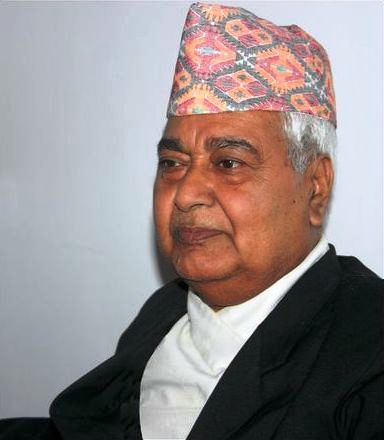![]()
The Words of the Jha Family
|
|
The Words of the Jha Family |

Address to the UPF Interfaith Assembly on The Significance of Religion for Peace and Human Development
Dr. Hyung Jin Moon, Your Excellencies, Distinguished Guests, Ladies and Gentlemen,
Please accept my greetings from the people of Federal Democratic Republic of Nepal, the country of Mt. Everest, the crown of the world; the birthplace of Buddha, the apostle of Peace; the famous Pashupati Temple, the most sacred place of worship for millions of Hindus, and a country of abundant natural beauty. I bring the friendship, love, and compassion from the lovely people of Nepal to those who have assembled here and also for the people of the whole world.
Chairman, Dr. Moon, I am still remembering our meeting in my office where you presented me with Father Moon's autobiography, As a Peace-Loving Global Citizen. And once again thank you for starting your World Peace Tour from Lumbini, Nepal, the birthplace of Buddha.
Religion has the solution for each and every problem of the human being, but it has to be understood and implemented properly in life. Religion is not an outwardly act; it is a inner way of living. It teaches us how to live in a family, how to live in society, how to live in our country, and how to live in the world. It teaches us about our duties and the proper manner of acting so we can become a treasure for the society. Religion does not teach us to fight amongst ourselves. All the religions of this world and all the religious scriptures: the Bhagavad Gita, the Ramayan, the Bible, the Qur'an, the Dhammapada, the Guru Granth Sahib, the Puran, the Upanishads, all teach the same thing:
Love your neighbor.
Love your people.
Love your parents.
Love everything.
Love is the greatest gift of God.
My country, Nepal, is also facing difficult challenges inn writing a new constitution and concluding our on-going peace-process. I am confident that the inclusive and proportional Constituent Assembly of Nepal will be able to write a new constitution according to the aspirations of the Nepalese people.
Peace, as we all know, is an overriding concern for all of us today. However, enhancement of human happiness is still far off. Spiritual values also appear to be in gradual decline. Intolerance is growing. Conflicts are proliferating. This is not at all a positive sign for human development and international harmony. Swami Vivekananda has observed, "Each soul is potentially divine. The goal is to manifest this divine within by controlling nature, externally and internally."
What is needed, therefore, is dialogue among civilizations with a sense of common responsibility towards humanity as a whole. For this to happen religion has an important role to play.
I am confident that this august gathering will result in important resolutions which can make human life more enlivening and meaningful.
I would like to thank the Universal Peace Federation, the organizers of the Interfaith Assembly, for giving me this opportunity to share my thoughts with this distinguished audience today. I am of the view that when there is joint resolve and commitment, the world can be transformed into a more pleasant and harmonious human society where peace, happiness, and human development are ensured.
Thank you very much. Namaste!
Namaste is one of a small list of Sanskrit words commonly recognized by Non-Hindi speakers. Namaste is a common spoken greeting or salutation originating from India and Nepal. It means:
"I honor the Spirit in you which is also in me."
"I honor the place in you in which the entire Universe dwells, I honor the place in you which is of Love, of Integrity, of Wisdom and of Peace. When you are in that place in you, and I am in that place in me, we are One."
"Your spirit and my spirit are ONE."
"That which is of God in me greets that which is of God in you."
"The Divinity within me perceives and adores the Divinity within you."